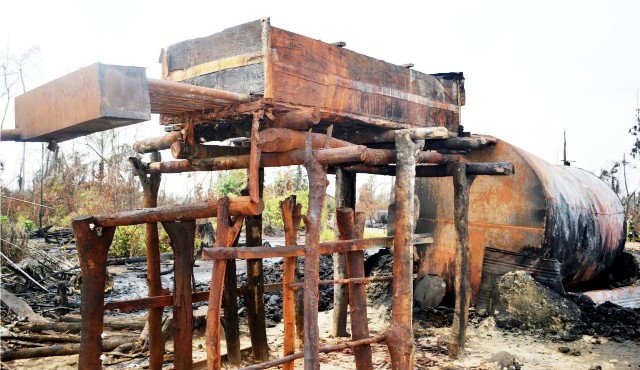Oil & Energy
Nigeria Targets 3rd World Largest Gas Exporter

The Nigeria Liquefied Natural Gas (NLNG) Ltd., says its ongoing plans to reach a Final Investment Decision (FID) on its Train-7 project by December will make Nigeria the 3rd world largest gas exporter.
The NLNG’s General Manager Production, Mr Tayo Ogini said this last Saturday while making a presentation on the facility located at Bonny Island.
The presentation was to acquaint the Minister of State for Petroleum Resources, Dr Ibe Kachikwu who visited the plant on the progress made on the project so far.
According to the presentation, Nigeria is presently the fourth exporter of gas in the world.
The NLNG has six operational trains (gas plants).
The first train was built in 1989 but by 2007 till date, plans to build Trains 7 and 8 were shelved.
The six trains have a combined capacity to produce 22 metric tonnes per annum (mtpa) of Liquefied Natural Gas (LNG).
However, plans to invest seven billion dollars on the Train-7 project would expand its production capacity to 30 mtpa making Nigeria the 3rd largest exporter of gas in the World after Qatar and Australia.
Ogini said the gas produced in Nigeria was world-class, adding that the NLNG had built a reputation of reliability in its gas supplies around the world.
According to him, the hub of crude oil exporters on the island namely: Shell SPDC, ExxonMobil and the NLNG can easily produce two million barrels of oil per day.
Ogini said the country had 23 NLNG carriers which had sailed more than 4,000 cargoes making it the largest in Africa.
He, however, said the companies were being faced by inadequate infrastructure, adding that with the three-year Bonny-Boro road project which the company had embarked on, part of the problem would soon be addressed.
Responding, Kachikwu commended the NLNG management for its efficiency, saying the company was a testament to the fact that things could be properly done in Nigeria.
He recalled that during the cash crunch of 2016, NLNG saved the day and helped to avert a shutdown of the nation’s economy.
According to the minister of state, the Train-7 project is fantastic but Nigeria is not yet where it should be.
He challenged the NLNG to begin to think of exporting 40 mtpa over the next 30 years, as well as tackle the issue of gas pricing as most importers of domestic gas prefer to bring in shipments than to patronise the NLNG.
Kachikwu, who also inspected the faciloity, said Nigeria’s 2019 elections would not interfere with the company’s expansion plan.
He said that whatever happened at the polls, FID on Train-7 as well as its construction would go ahead.
On NLNG assisting Brass and Olokola LNG projects, he scored the companies 100 per cent in terms of performance.
“We have opportunities that are stranded everywhere – Brass LNG in terms of shareholding and financing; OKLNG in terms of even taking off the ground.
“I am saying as the grandfather of this business – they built six trains, looking at seven, hopefully potentially more. Let’s begin to look at minimal investments, through structures and designs and reconfiguration and expert advice.
Oil & Energy
NERC, OYSERC Partner To Strengthen Regulation

Oil & Energy
NLC Faults FG’s 3trn Dept Payment To GenCos

Oil & Energy
PENGASSAN Rejects Presidential EO On Oil, Gas Revenue Remittance ……… Seeks PIA Review

-
Maritime5 days ago
Nigeria To Pilot Regional Fishing Vessels Register In Gulf Of Guinea —Oyetola
-

 Sports5 days ago
Sports5 days agoGombe-Gara Rejects Chelle $130,000 monthly salary
-
Maritime5 days ago
Customs Declares War Against Narcotics Baron At Idiroko Border
-

 Sports5 days ago
Sports5 days agoTEAM RIVERS SET TO WIN 4×400 ” MORROW” …Wins Triple jump Silver
-

 Sports5 days ago
Sports5 days agoNPFL Drops To 91st In Global League Rankings
-
Maritime5 days ago
NIMASA,NAF Boost Unmanned Aerial Surveillance For Maritime Security
-

 Sports5 days ago
Sports5 days agoNIGER DELTA GAMES PANACEA TO YOUTH DEV”
-

 Sports5 days ago
Sports5 days agoNPFL Impose Fines On Kwara United Over Fans Misconduct

